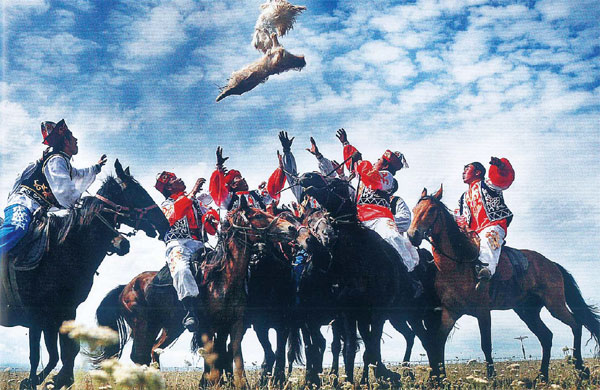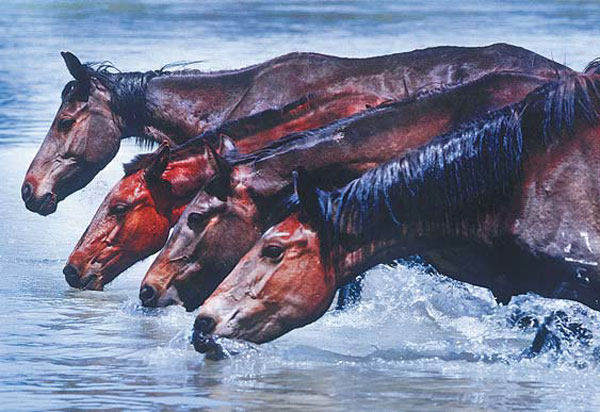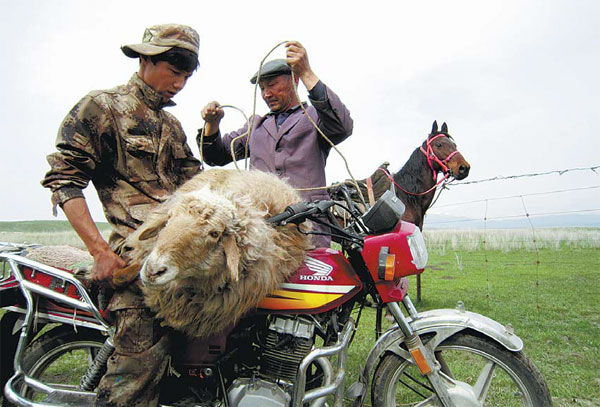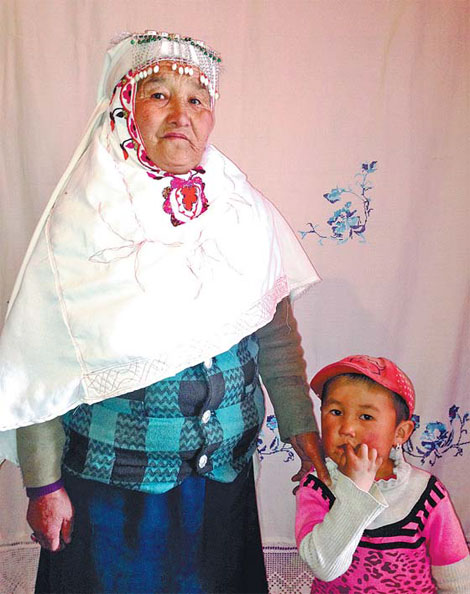Nomads' treat a headless sheep

Kazakh sacrificial feast of honor is not for the fainthearted
We followed death to the pasture.
This sacrificial lamb was slain to honor us.
| Kazakh nomads play polo with headless sheep on their summer pasture in Zhaosu. Provided to China Daily |
| Kazakh nomads' horses drink water by the river. |
We arrived late, after the decapitation.
We'd returned from chasing newborn livestock with an 8-year-old ethnic Kazakh nomad beneath snowcapped mountains to see his grandfather, Huan Sezdehan, sawing the hide from a beheaded sheep, dangling by its back legs.
Its unblinking face gazed at us from the ground, next to a vat frothing with blood - byproducts of halal butchering.
Huan Sezdehan's grandson Nurhanat Yergayit was stabbing the air with a disembodied hoof.
This is a feast in the Xinjiang Uygur autonomous region's Kazakh communities.
The boy later charred skewered chunks of sheep over the family's portable stove. Most of the mutton was fried outside and served on a sheet on the floor.
Nomads do not lug tables around. Understandably. Doing so would defy logistics' logic.
We ate the meat with our hands, according to local custom.
Afterward, we scrubbed off the grease.
I had committed a faux pas the previous day, when I rinsed my fingers before dining on horse intestines and noodles we ate without utensils in another nomadic home.
I'm still not sure if I cursed myself, or my hosts, or both.
My host poured water from a kettle over my hands before eating.
I believed this to be more hygienic than ritualistic.
But he poured again, and then once more.
I was later told the custom is to cleanse three times.
After he had indicated he had finished, I flicked my fingers dry.
Apparently, that represents whipping away good fortune.
I knew better before my second meal served among nomads and instead dabbed my palms dry with a towel.
We had insisted Huan's family not to slaughter the sheep. Still, he and his 22-year-old son, Nursuntan Huan, cornered the creature, lashed it to his motorcycle and zipped out of sight across the prairie.
A sheep is worth about $160 (142 euros) - a sixth of the household's annual income. In the end, the creature bleated louder than our protests.
That's the exalting hospitality of the nomadic Ili Kazak autonomous prefecture's Zhaosu county.
The boy playfully swished the disembodied hoof through the air like a wand, squished gobs of meat between his fingers and gnawed at the pelt with a pair of pliers while his father carved up the carcass. I thought about the herders' relationship with food and the animals that provide it - that are it.
I've rarely seen my food breathe. They rarely don't see theirs breathe.
Ili's nomads' lives revolve around their livestock.
It's a place where animals not only provide sustenance but also entertainment. People hunt with eagles, play a version of polo with decapitated sheep and stage horseraces for fun.
Zhaosu's children start riding horses when they are 5.
The typically scattered drifters congregate on isolated knolls on weekends to hold horseraces. Only boys aged 8 to 12 compete. Their nimbleness injects speed into the steeds.
We watched a 12-year-old's mount eject him mid-race. He got up, wiping onto his sleeve blood that oozed from his nose and lip.
A winner of that day's competition explained that parents check on the horse first if an accident happens when a child is riding.
The herders care more for sick sheep than healthy human family members - kin literally take a back seat if the family owns a truck - and mourn flocks' miscarriages.
Ili's livestock roam seasonal lanes on certain roads and bridges.
Its epic migration of tens of thousands of animals and thousands of people from winter to spring pastures is peak season for traffic police.
I photographed a policeman smooching a premature lamb on the lips as he stretched out on the grassland.
"Places with lots of sheep are different from places with lots of people," he says.
"Sheep listen to instructions. People don't."
In other words, shepherding is in some ways easier than policing.
That said, the congestion on the prefecture's roads is more likely to come from tangles of hooves than wheels at any time of year.
Relationships with livestock change after they are beheaded.
Kazakh nomads have for millennia passed summers playing buzkashi - basically polo with a decapitated sheep carcass. The decapitation again honors Islamic customs of slaughter.
Two teams of horseback riders line up on either side of a field and - at the word "Go!" - strike forward at lightning speed with a thunder of hooves to grab the roughly 30-kilogram carcass to hurl it into a goal.
Once the corpse is seized, others aggressively try to snatch it away. It's a mosh pit of grabbing and jabbing horses and hands.
"It's hard," Nursuntan says.
"You have to haul a heavy sheep with one arm."
Clans take turns slaughtering and often stuff hides rather than play with the corpse packed with everything naturally inside the hide, to share and cut costs. But these are torn to tatters after a few sessions.
"There's not much else to do on the grassland," Nursuntan says.
"It's how we pass time."
Our lunch the day before, when my courteous intentions were sullied by how I washed my hands, was of horse intestines with Hasan Wormanbek, 76, one of about 100 men in Zhaosu's Sarkuobu village who hunt with golden eagles.
The wintertime mountainside hunting sessions keep him spry, he says.
Our time with the Kazakh nomads made me wonder anew what they know that we don't, so, I asked.
"We're fit because we do manual labor," Sezdehan says.
Herders eat natural food they produce. They drink from streams of melted mountain snow they don't need to filter or boil, he says.
"City people get their food from stores and sometimes sleep late because they can be lazy.
"They spend money in fancy shops. We don't earn much. But we save a lot. It's easier on the grassland. There's nowhere to spend."
Zhaosu's average annual household income is 6,000-10,000 yuan.
But nomads navigate a world according to a compass upon which nature, rather than money, is true north.
I thought of the sheep we were eating, the one I saw breathing.
Our hosts are used to knowing what they eat - to the extent of recalling the personality a meal had before it ended up on their plates.
Life lessons can be learned from that death on that pasture.
Cui Jia contributed to this story.
erik_nilsson@chinadaily.com.cn
| Huan Sezdehan helps his son tie a sheep to a motorcycle. Erik Nilsson / China Daily |
| A Kazakh woman at home in Zhaosu. |
(China Daily European Weekly 06/12/2015 page24)
Today's Top News
- Japan tempting fate if it interferes in the situation of Taiwan Strait
- Stable trade ties benefit China, US
- Experts advocate increasing scope of BRI to include soft power sectors
- New engine powers cargo drone expansion
- China to boost green industry cooperation
- Manufacturing PMI rises in November


































